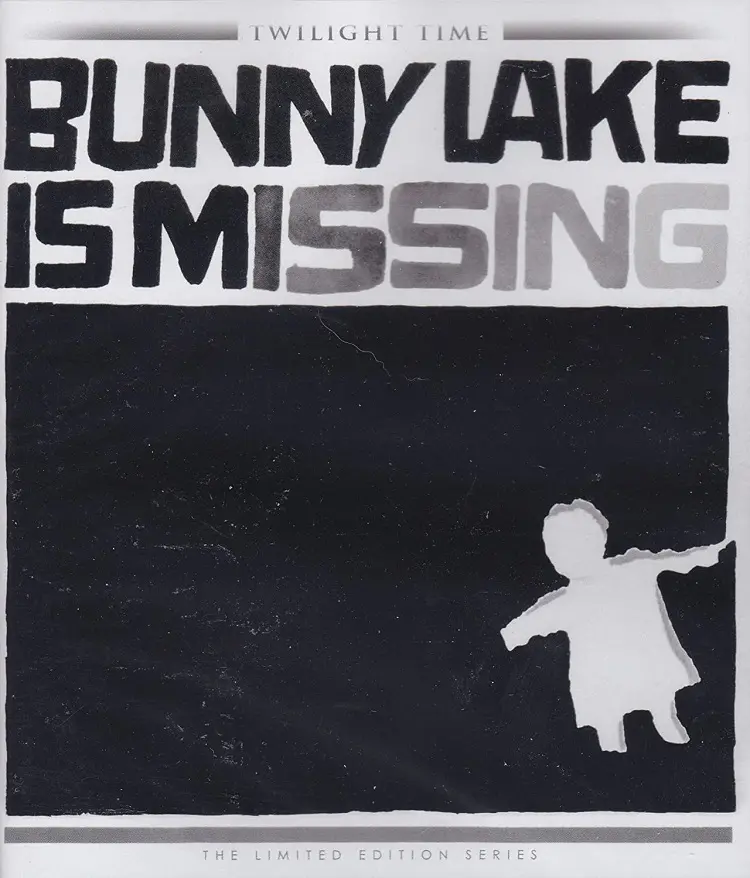
As soon as the opening credits of Bunny Lake Is Missing fade in following the perfunctory Columbia lady logo, it’s obvious that this is an Otto (Anatomy of a Murder) Preminger film. A hand reaches up onto the completely black screen, ripping pieces of the darkness away to show us just enough for the incredible iconic work of Saul Bass to reveal the men and women responsible for this magnificent work of cinematic art. Likewise, director Preminger only shows us fractions of the light throughout this psychological thriller revolving around a missing child in London during the revolutionary mid ’60s (you know, when all the fun started?).
Here, Carol Lynley – in one of her final “legitimate” roles before her Irwin Allen/television horror movie/TV guest star days – portrays Ann Lake: an American lass who has recently joined her beloved journalist brother (as played by future 2001: A Space Odyssey star Keir Dullea) in London. Dropping her four-year-old daughter Bunny off at a fussy school run by self-absorbed self-important snobs, the single mother returns later in the day to find, well, the eponymous situation. It’s the nightmare that keeps many a good parent awake at night: a disappearance. But that’s just the tip of the iceberg with Otto Preminger, especially once the top-billed Laurence Olivier arrives in this adaption of the Merriam/Marryam Modell (The Nanny) novel of the same name.
Cast as the wise, nearly unemotional detective assigned to locate the missing Bunny Lake, Olivier’s Superintendent Newhouse begins to suspect that there is much more to the Lake family’s story than a simple abduction. Namely the fact that all of the evidence at hand suggests Ann’s daughter doesn’t actually exist – and may be the figment of a poor American woman’s potentially unbalanced mental state (just as all of the English folk in the film are a tad rude, the Americans are seen as being a bit crazy). Preminger delightfully leads a trail of breadcrumbs for his audience to follow before turning the tables on us in a joyful twist wherein the popular songs of England’s other famous ’60s rock group, The Zombies (e.g. “Just Out of Reach”, “Remember You”), serve as an underlying Greek chorus during several scenes when Paul Glass’ effective score just isn’t enough.
Clive Revill co-stars as Olivier’s assistant (if there was ever two cops I would have loved to see re-appear in a spin-off, it’s these two); Noel Coward has an extended cameo as Lynley’s sleazy perverted landlord, who alleges to possess both the whip and the skull of the Marquis de Sade (whom Mr. Dullea would portray immediately after starring in 2001 a few years later); and Martita Hunt and the late Anna Massey represent the school that has trouble with its maths. Preminger laces his psychological thriller with numerous appearances by one familiar face after another, many of whom show up for ten seconds (but who receive billing in the movie’s extensive Saul Bass opening credits), such as Finlay Currie, Adrienne Corri, and John Forbes-Robertson (the only other actor to portray Count Dracula in the legendary Hammer film series apart from Christopher Lee).
Although The Zombies’ memorable contribution to the story primarily consists of a television broadcast in a pub, Bunny Lake Is Missing was one of the first films in motion picture history to make use of a popular musical act to promote a movie. And this is very memorably chronicled for all to see in one of the picture’s trailers. Bunny Lake was given a gimmick that stated no patron would be seated after the feature film began (to wit a ticking promotional clock outside of the theater counted down), and The Zombies appear as themselves in a trailer, replacing the words of their hit “Just Out of Reach” with a silly little cover (re-)titled “Come On Time”.
Preminger himself also appeared in a trailer urging the audience to show up in a timely fashion (or suffer the consequences). Both of these gimmicky previews appear here in Twilight Time’s new Blu-ray in addition to a third, more traditional trailer. Also on-hand here is an isolated score of the Paul Glass soundtrack, as presented in DTS-HD 2.0 MA lossless sound; liner notes by Julie Kirgo; and an audio commentary with film historian Lem Dobbs and hosts Julie Kirgo & Nick Redman. (I find it somewhat odd that Mr. Forbes-Robertson is referenced as Dracula in the commentary, despite he only played the part once in the bizarre latter-day Hammer kung-fu vampire flick, The Legend of the 7 Golden Vampires – which even Christopher Lee, who admittedly hated the deteriorating quality of the series, refused to make! It was the only claim to fame the poor guy had, I guess.)
Twilight Time’s new 1080p HD presentation of Bunny Lake Is Missing brings us a beautiful widescreen transfer as taken from equally gorgeous source material (courtesy of the Columbia/Tristar/Sony Pictures vault) that proudly exhibits the masterful photography of Oscar/BAFTA-winner Denys N. Coop. For a film that is always leaving us in the dark in one respect or another, the black levels for this video presentation are quite appropriate throughout, especially during the film’s ultra-creepy moment set in Finlay Currie’s “Doll Hospital” (and if you don’t know what I’m talking about, you’re just going to have to find out for yourself!). The feature film is accompanied by an English DTS-HD 1.0 MA lossless soundtrack, with optional (SDH) subtitles available should viewers need them.
Twilight Time’s new Blu-ray release is limited to only 3,000 units, and comes as a recommended offering.